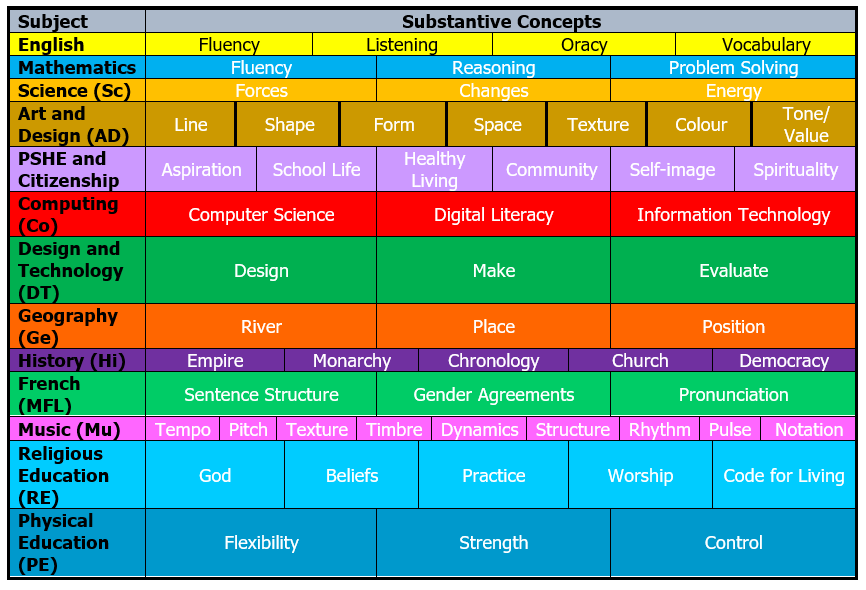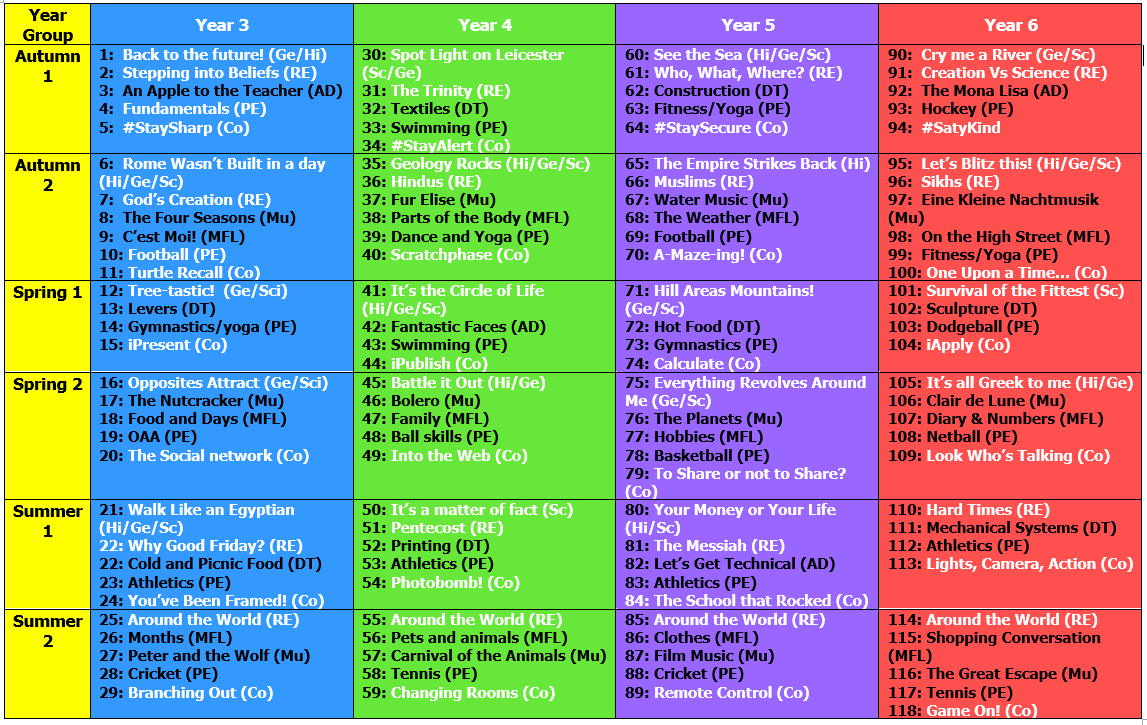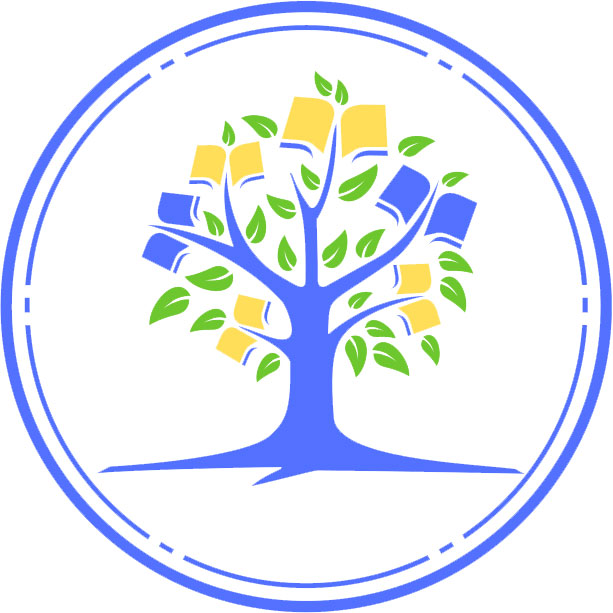The Great Barwell Learning Adventure
This is the beginning of 'The Great Barwell Learning Adventure'. To discover how we formed our curriculum and the research behind it , please follow this page through, clicking on the drop down menus. For quick links to individual subject areas, please click on the areas on the right hand side of this page.
Our curriculum needs to enable children to know more, to understand more and do more. In order to do this, we need to be extremely well informed about pedagogic subject knowledge and build a curriculum based, not only on sound research but knowing what works for our school.
Vocabulary and books need to be at the heart of learning and the curriculum needs to be strategically planned so that deliberate links are made within learning across subjects, within year groups and within subjects across the key stage so that key ideas are revisited.
There needs to be a consistent approach whilst still allowing for an understanding of how different subjects need to be organised in order to prepare our children for their next stage of education and also building on their previous learning in Key Stage 1. We must have the highest expectations that all children can reach national expectations or above whilst also building children’s cultural capital so they can be successful throughout their lives. In order to be successful in these aims, we need to be explicit in knowing where we want children to get to at key points in their learning and use assessment to inform our planning.
Rationale
There are many debates that are contested within the educational sphere throughout the last few years but none more so than the hotly contested discussion surrounding the pedagogical approaches to learning relating to a traditional approach versus a progressive approach. Edutweeters risk their ‘social media’ lives in order to argue that they are right and there are often strong accusations flying about. However, cutting through the trees to see the wood, what emerges is the fundamental principal that the curriculum in a school should be at the heart of learning and drive its practices and approaches. Too often, the curriculum is not holistically thought out and not strategically planned and this can have a detrimental impact on children’s learning: the ‘it’s the way we do things here’ approach. In addition, with the removal of levels within schools, assessment in many cases is the driving force behind what is taught rather than assessment being a tool to aid the curriculum. So, it follows that the real debate should not be about what approach we use from the divide in education and pin our colours to the mast but rather to be asking ourselves questions about what our children need and design a curriculum to match those needs that is strategically planned across the whole school. Many schools are successful, regardless of their pedagogical approach because of the consistency and drive within the school to achieve the same shared vision.
Our Barwell Curriculum followed the National Curriculum 2014 and had many strong elements that we believed supported children’s learning. It was exciting and engaging and linked to children’s interests and took them on a ‘journey’ of discovery. Our subject areas were presented in a thematic approach to ensure that time was maximised and that Literacy was at the heart of all learning. However, time and time again, staff asked themselves why learning was not ‘sticking’? They repeatedly questioned what were the barriers preventing our children from being successful?
It was these questions that initiated the start of The Great Barwell Learning Adventure!
Research
In order to begin our journey, as a staff we focused on the work of educationalists, neuroscientists and psychologists to ensure that our work was grounded in the pedagogy of learning. We used assessment data to see which groups of pupils in our school and nationally make less progress than others and we asked stakeholders what was important to them in a new curriculum. This enabled us to develop a set of principles unto which our curriculum could be attached so that we could always ensure that we focused on what was important. Alongside developing this curriculum, teachers are also focused on continuously improving the quality of their classroom practice, their Personal Professional Development through our Professional Growth Projects, and their leadership skills through external provision. All of this professional development is set out in the Professional Growth for Teachers Document in the Great Staff Expedition.
Principles
Below is a set of principles that our Learning Adventure is built upon:
- Inspiring, immersive and creative – we want children to enjoy the act of learning
- Belongs to Barwell – we are an outward-facing school that collaborates with many others and reads widely but ultimately, our curriculum will be unique to us as it is built for us
- Reading and vocabulary – our curriculum will be built around reading and vocabulary to address the gap in word knowledge and life experiences
- Widens children’s experiences – it will engage children in things they have not done before or thought about before. Its roots will spread out from our locality into the surrounding county and then spread to national and global learning. We want our children to be able to go out into the world and be a successful person
- Develops global courageous citizens – we want to provide opportunities for exploring historic and current locations, cultures, events and issues to inspire future thinking, aspiration and advocacy
- Challenging with high expectations – it will set out exactly what we want children to know and we will check this at regular intervals
- Character development – character development will be woven throughout
- A clear writing process – there will be a focus on writing for different audiences and purposes linked to tier 2 and tier 3 vocabulary
- Families involved throughout – parents will be involved in the Learning Adventure throughout
- It will be a 3D curriculum – vertical links will be deliberately constructed within a subject so they are revisited across Key Stage 2. Horizontal links between subjects will be deliberately planned so that children experience the same theme in different areas of the curriculum. Diagonal links will allow for children to see how concepts are joined across both year groups and subjects.
- Retrieval practice – there will be ample opportunities for children to practise retrieving knowledge in a low stakes environment
- A thematic approach – our learning will be presented in a learning journey where subjects are grouped together where this works best for learning. Where it is better for learning for subjects to be taught discretely, this will be planned for but all staff will have an awareness of the curriculum as a whole so they understand how it all fits together
- Reduces teacher workload – our curriculum should aid teachers in focusing on things that have a positive impact on children
- Promotes the Equality Act (2010) – our curriculum will give children the chance to explore diversity through picture books each half term
- No one size fits all – we recognise that all subjects are different and may need different approaches
- Substantive concepts and bridging concepts will be identified – staff teaching the curriculum will be aware of the substantive concepts and where they appear in their teaching and what prior knowledge is needed to be able to access the learning
- Problem solving –
- Beyond the classroom – we want our curriculum to continue beyond the classroom door with opportunities for all children throughout the school day, the school building and beyond
Overview of our Learning Adventure
As was discussed in the rationale for this curriculum, one of the principles that underpin how successful a school is with their curriculum is the shared vision and consistency of approach. Therefore, below is an overview of how our curriculum will be delivered across the school in every year group.
- Topics will be delivered in a Learning Journey style
- The Home Voyage will provide a link between the learning at school and learning at home giving families the chance to talk about themes and practise work across the curriculum
- Each half term will start with an ‘Immersion Day’
- The Immersion Day will introduce the focus book for the half term and will spend time reading and producing artwork
- Every Learning Journey will have a Learning Journey Map which will detail exactly what the children must know by the end of the Learning Journey
- Low stakes quizzing will take place weekly and at the beginning and end of each learning Journey. Low stakes testing will also feature within teaching
- Children will produce an end product: this will be detailed in the Learning Journey Guide and will be used as an opportunity for children to apply the knowledge gained
- Children will produce a Key Outcome piece of work that ties their learning together
- Some Learning Journeys will have a picture book that is matched to the theme
- Some Learning Journeys will have a picture book that is focused on diversity
- The whole school will follow the same timetable
- Each Half Term will culminate in a ‘Destination Display’ which will replace a staff meeting in the final week of each half term. Each year group will showcase the work that they have done to parents ensuring that each child has at least one piece of work displayed
- Each Learning Journey will set out the Substantive Concepts that are covered in that Learning Journey and the Bridging Concepts that detail the knowledge needed to access that Journey
Substantive Concepts
All of our Learning Journeys have knowledge at their heart. The knowledge can be seen as two distinct types: substantive knowledge and disciplinary knowledge. Substantive knowledge is the ‘substance’ of the subject – what is actually being taught as established fact. Disciplinary knowledge is how the knowledge is formed in that subject, for example, field work, source analysis, working scientifically and so on. There are three types of substantive knowledge: Type 1 – some concepts and terms are highly specific to a particular period or place and their meaning needs to be explicitly taught; Type 2 – other concepts that originated in specific concepts may come to be applied more widely; Type 3 - others have a much wider application and are applied in many contexts. These are Substantive Concepts.
In every subject we have identified the Substantive Concepts and where they appear in our curriculum. The idea is not to teach these concepts in isolation but rather, as teachers, to have an understanding of how these concepts transcend across Learning Journeys and build up children’s core knowledge by revisiting them and exploring them in different contexts to enable deeper, longer lasting understanding.
Below are our Substantive Concepts for each subject in our curriculum:


For more information about out curriculum, please feel free to come and speak to our Curriculum Leads.

